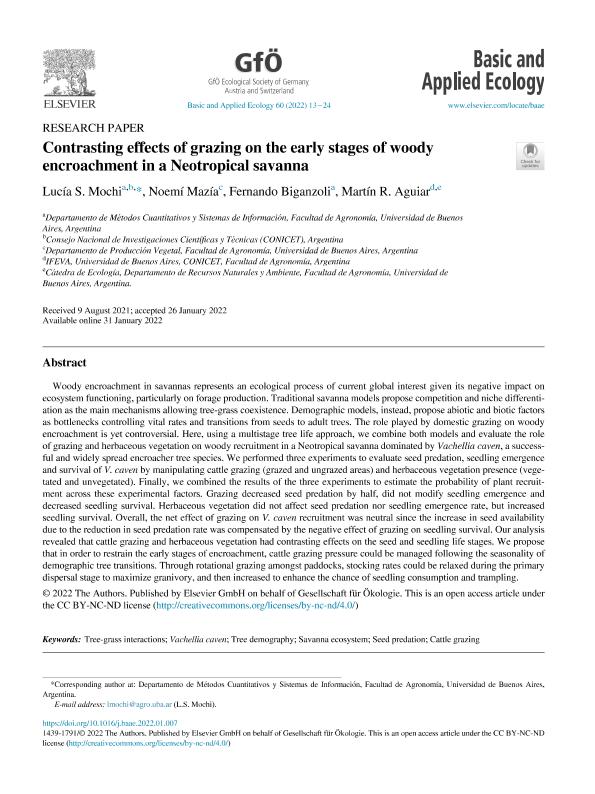Artículo
Contrasting effects of grazing on the early stages of woody encroachment in a Neotropical savanna
Fecha de publicación:
05/2022
Editorial:
Elsevier Gmbh, Urban & Fischer Verlag
Revista:
Basic and Applied Ecology
ISSN:
1439-1791
Idioma:
Inglés
Tipo de recurso:
Artículo publicado
Clasificación temática:
Resumen
Woody encroachment in savannas represents an ecological process of current global interest given its negative impact on ecosystem functioning, particularly on forage production. Traditional savanna models propose competition and niche differentiation as the main mechanisms allowing tree-grass coexistence. Demographic models, instead, propose abiotic and biotic factors as bottlenecks controlling vital rates and transitions from seeds to adult trees. The role played by domestic grazing on woody encroachment is yet controversial. Here, using a multistage tree life approach, we combine both models and evaluate the role of grazing and herbaceous vegetation on woody recruitment in a Neotropical savanna dominated by Vachellia caven, a successful and widely spread encroacher tree species. We performed three experiments to evaluate seed predation, seedling emergence and survival of V. caven by manipulating cattle grazing (grazed and ungrazed areas) and herbaceous vegetation presence (vegetated and unvegetated). Finally, we combined the results of the three experiments to estimate the probability of plant recruitment across these experimental factors. Grazing decreased seed predation by half, did not modify seedling emergence and decreased seedling survival. Herbaceous vegetation did not affect seed predation nor seedling emergence rate, but increased seedling survival. Overall, the net effect of grazing on V. caven recruitment was neutral since the increase in seed availability due to the reduction in seed predation rate was compensated by the negative effect of grazing on seedling survival. Our analysis revealed that cattle grazing and herbaceous vegetation had contrasting effects on the seed and seedling life stages. We propose that in order to restrain the early stages of encroachment, cattle grazing pressure could be managed following the seasonality of demographic tree transitions. Through rotational grazing amongst paddocks, stocking rates could be relaxed during the primary dispersal stage to maximize granivory, and then increased to enhance the chance of seedling consumption and trampling.
Archivos asociados
Licencia
Identificadores
Colecciones
Articulos(IFEVA)
Articulos de INST.D/INV.FISIOLOGICAS Y ECO.VINCULADAS A L/AGRIC
Articulos de INST.D/INV.FISIOLOGICAS Y ECO.VINCULADAS A L/AGRIC
Articulos(OCA PQUE. CENTENARIO)
Articulos de OFICINA DE COORDINACION ADMINISTRATIVA PQUE. CENTENARIO
Articulos de OFICINA DE COORDINACION ADMINISTRATIVA PQUE. CENTENARIO
Citación
Mochi, Lucia Sol; Mazía, Cristina Noemí; Biganzoli, Fernando; Aguiar, Martin Roberto; Contrasting effects of grazing on the early stages of woody encroachment in a Neotropical savanna; Elsevier Gmbh, Urban & Fischer Verlag; Basic and Applied Ecology; 60; 5-2022; 13-24
Compartir
Altmétricas




